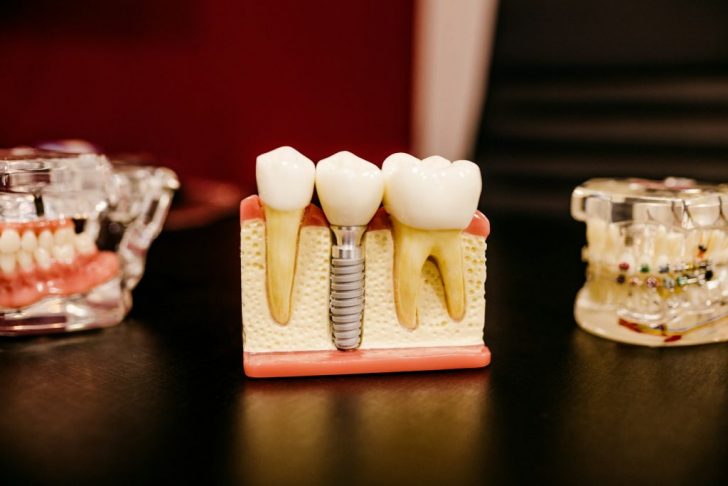
Do Dental Implants Hurt? Here’s All You Need to Know

When you hear “dental implants,” you might wince at the thought of pain. But do dental implants hurt as much as you imagine? The first thing you need to know is that the discomfort from dental implants is usually temporary and manageable.

Olly / Pexels / Immediately after the procedure, it is common to experience some pain and swelling, similar to what you might feel after a tooth extraction.
This initial discomfort generally lasts a few days, with significant improvement within a week. However, most patients report that the pain is manageable with over-the-counter pain medications like ibuprofen or acetaminophen. The discomfort is often described as mild to moderate, akin to a dental filling or a minor oral surgery.
By the end of two weeks, the majority of the pain and swelling should subside. Thus, this will leave you on the path to enjoying your new dental implants pain-free.
What are the Major Types of Dental Implants?
Before we delve deeper into the phases and pain management, let’s understand the two main types of dental implants:
Endosteal Implants
These are the most common types of dental implants. They are surgically placed directly into the jawbone and act as a root for the artificial tooth. Over time, the bone grows around the implant, securing it firmly.

John / Unsplash / Endosteal and Subperiosteal Implants are two major types of dental implants.
Subperiosteal Implants
These are placed under the gum but on or above the jawbone. This type is used for patients who do not have enough healthy jawbone and cannot, or do not want to, undergo a bone augmentation procedure to rebuild it.
What are the Phases of Dental Implant Procedures
Understanding the phases of dental implant procedures can help set your expectations and alleviate any fears you might have about pain.
Consultation and Planning
The journey begins with a thorough consultation and planning phase. Your dentist will evaluate your oral health, take X-rays, and develop a customized treatment plan. This phase is pain-free and involves discussing your medical history, the number of teeth to be replaced, and the overall health of your jawbone.
Surgical Procedure
This is where the magic happens and, understandably, the phase where most people worry about pain. During the surgery, your dentist will place the implant into your jawbone.
The good news? You won’t feel a thing during the procedure itself because it is performed under local anesthesia. However, some patients may opt for sedation for additional comfort.
After the anesthesia wears off, you may experience some discomfort. This is typically managed with prescribed pain medications and resolves within a few days.
Healing and Osseointegration
The final phase involves healing and osseointegration, where the implant integrates with your jawbone. This can take several months. During this period, any discomfort is usually minimal and related to the healing of the surgical site.
Despite the temporary discomfort, dental implants come with numerous advantages that make them worth considering.
Do Dental Implants Hurt Then?
Now, to address the million-dollar question: “Do dental implants hurt?” The answer is more nuanced than a simple yes or no. The dental implant procedure itself does not hurt thanks to effective local anesthesia. However, you can expect some discomfort following the surgery, similar to any other dental procedure involving surgery.

Tima / Pexels / While the dental implant procedure itself does not hurt, you might feel discomfort after the surgery.
Here is a quick breakdown:
- During the Procedure: You will not feel pain due to anesthesia.
- After the Procedure: Expect mild to moderate discomfort for a few days, managed with painkillers.
After the initial healing period, you should not experience pain, and the implants should feel like natural teeth.
More in Treatment
-
`
5 Reasons Why Dad’s Side of the Family Misses Out
Family bonds are intricate and multifaceted, often creating a unique tapestry of connections. However, many people notice a peculiar trend: stronger...
July 12, 2024 -
`
A Quick Guide on How to Get Short-Term Disability Approved for Anxiety and Depression
Living with anxiety or depression poses unique challenges, particularly in the workplace, where stress can exacerbate symptoms. For many, short-term disability...
July 5, 2024 -
`
Why Do People Feel Sleepy After Eating?
Is feeling sleepy after eating a sign of diabetes? Well, not directly. There are many reasons why you feel drowsy after...
June 20, 2024 -
`
What Is High-Functioning Depression? Symptoms and Treatment
High-functioning depression may not be a term you hear every day, but it’s a very real and challenging experience for many....
June 13, 2024 -
`
Kelly Clarkson’s Weight Loss Ozempic Journey – Debunking the Rumors
In a refreshing moment of transparency, Kelly Clarkson, the beloved singer and talk show host, sheds light on her remarkable weight...
June 3, 2024 -
`
What Is the Best Milk for Gut Health and Why?
In recent years, the milk section at the grocery store has expanded far beyond the traditional options. While cow’s milk has...
May 30, 2024 -
`
5 Key Differences Between A Psych Ward & A Mental Hospital
Curious about the differences between a psych ward and a mental hospital? You are not alone. With the mental health conversation...
May 16, 2024 -
`
It’s Official! “Selling Sunset’s” Christine Quinn & Husband Christian Dumontet Are Parting Ways
Have you ever found yourself unexpectedly engrossed in the personal lives of celebrities, especially when their stories take dramatic turns? Well,...
May 9, 2024 -
`
What is Premarital Counseling and Why Consider It?
Congratulations! You’ve set a date, picked out your dream dress, and booked the perfect venue. But amidst the whirlwind of wedding...
April 30, 2024










You must be logged in to post a comment Login